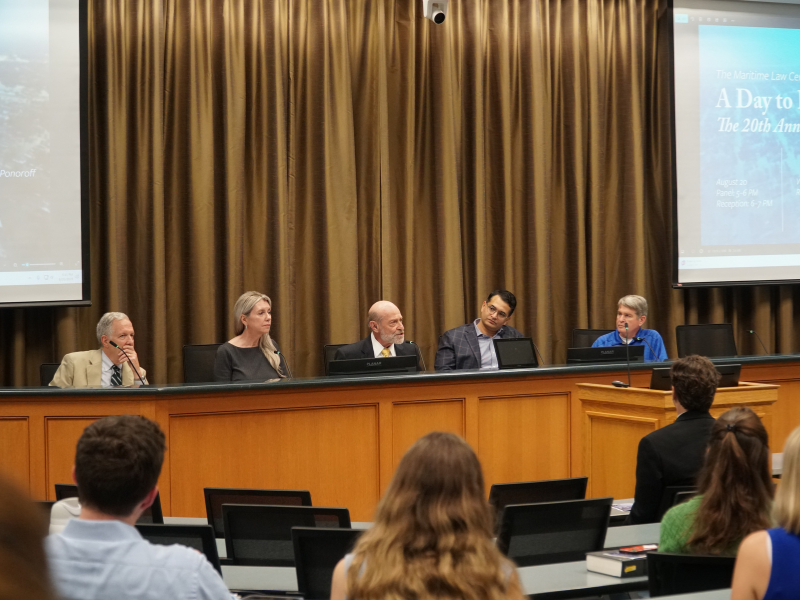20 Years Later, Tulanians Reflect on Hurricane Katrina’s Legacy
As the 20th anniversary of Hurricane Katrina approaches, the Tulane Maritime Law Center convened a powerful panel of Tulanians who lived through the storm in very different ways. What emerged was not just a history lesson, but a reminder of resilience, leadership, and above all, community.
Dean Emeritus Lawrence Ponoroff, who led Tulane Law School in the aftermath of the catastrophic storm, opened the evening with a vivid account of steering the school through one of its most uncertain chapters. He recalled being in Houston with then-President Scott Cowen, whose mantra was “Survival, Recovery, Renewal” and then organizing campus leaders to rebuild programs and bring the campus back.
When students finally returned in January, the semester was unlike anything Tulane, or any other law school, had seen before. Dubbed a “semester on steroids,” students attended classes six days a week to make up for lost time. “There was just this attitude that semester that we’re all in this together, and we’re going to get it done, no matter what it takes,” Ponoroff said.
For Judge Meredith Grabill (L’06), then a 3L and Editor in Chief of the Tulane Law Review, the storm tested not only her resolve but also the continuity of one of the school’s most important institutions – its flagship law journal. Separated from her fellow members by physical distance and limited by the technology of the time, she remained determined to see that year’s volume published. Why? To honor contracts with faculty and academics who were committed to supporting the Review, to ensure the transfer of institutional knowledge between classes, but most importantly, because, as she put it, “whenever you’re in a crisis, routine, familiarity, and friendship are what get you through.”
Friendship and connection also defined the experience of Hari Krishna, an LLM student from India. As the only one of his cohort with a working cell phone, Krishna became a lifeline connecting classmates with law schools across the country willing to host them. “I doubt that there’s anybody in the LLM class of that year that does not owe what they ended up doing to Hari Krishna,” said Professor Martin Davies.
If Krishna’s role embodied community, Michael Vitt’s embodied courage. A Tulane Law graduate working as in-house counsel at Bisso & Son, Inc., he spent the storm on a tugboat on the Mississippi River, charged with keeping an under-construction vessel secured at a shipyard. After Katrina made landfall, Vitt (L’01) and his crew turned from shipkeepers into first responders, evacuating hundreds of people, fighting fires, and ferrying fuel to fire trucks and generators across the city. There was, he said, “no way to explain what it was like to see the city suffer the way it did.” That heartbreak only underscored the importance of the work he and his crew carried out.
The evening’s final voice, Grady Hurley (A&S'76, L’79, LLM'81), president of the Maritime Law Association of the United States, tied those stories together with a broader reflection on the role of lawyers in times of crisis. Serving as president of the New Orleans Bar Association during Katrina, Hurley evacuated to Houston, where he worked out of Jones Walker’s offices. That experience, he noted, forced the profession to adapt, embracing remote work and new technology, while drawing on lawyers’ existing “don’t lose” mentality.
Hurley left students with a powerful charge:
“Lawyers are important people. You are important people. Katrina is a great example of what countless nameless lawyers gave back to the community because of their insights, their analysis, and their abilities.”
The thread that bound together each of these Tulanians’ accounts, whether told from a law review office, a tugboat, or an evacuation site, was unmistakable: community. And that was the message they left with today’s law students, who now carry forward not only the legacy of Katrina but also the responsibility of their profession.
Watch the panel in its entirety here.

